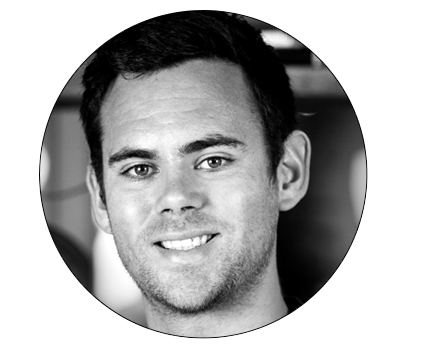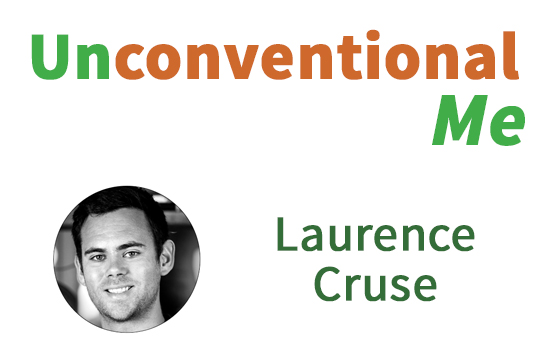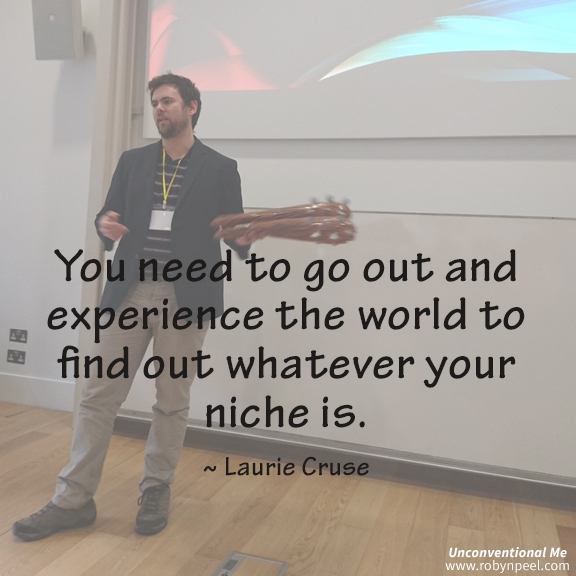 One of the many things I love about people with unconventional careers are they are always growing, learning and changing. However, in this case it’s been the downside of taking so long to get from interview to publication!
One of the many things I love about people with unconventional careers are they are always growing, learning and changing. However, in this case it’s been the downside of taking so long to get from interview to publication!
When I interviewed Laurie Cruse in October 2015 he was working on his own business Slingshot, an online recruitment marketplace for purpose-driven millennials that used a crowd-filtered system to filter through the applications. With a one-line vision of “solving the countries employment problems” I was intrigued by the business, but more importantly the drive, vision and focus of Laurie himself.
Since that interview Laurie has stepped away from Slingshot (writing a fantastic article about the decision to do so) and is now working as the Head of Talent at Gyana. Although his day job may be different, I think there is so much wonderful insight in this interview that I wanted to share. Our stories and careers may change, but part of the unconventional way is being open and embracing that change.
I have a feeling that the vision of solving the countries employment problems may still be on the cards for this dynamic man.
To listen to the full interview, click on the audio link below.
Tell me where you’re at with your business Slingshot at the moment.
I’ve been running an offline version for about a year now and I’ve basically proven the concept. I’ve got partner companies signed up and done about 35 placements with them. Now I’ve teamed up with a couple of techies who are cofounding a new company with me and we’re going to be building this together.
We are going through a couple of accelerator applications at the moment which will kick off in January 2016 if we’re successful. We’ve also got some fundraising rounds coming up.
The concept of crowd filtering is a new one to me. Can you tell me more about that?
The crowd filtering is mainly because I have a passionate hatred for recruitment agencies. I used to work for a recruitment agency and I was like why are people spending so much money on these guys?! What sort of value do they offer companies? And the main thing recruiters can do that companies pay for is that they have human filtration. They have a recruitment consultant who’ll look through applications, make an assessment on who is worth interviewing, qualify that individual and then present them to the company and then be charged anywhere between £5,000 – £15,000 for the privilege.
So my thinking was we could get rid of recruitment agencies if we could delegate the responsibility of human filtration to somebody else. Now a lot of other companies are going along the technical route, so they’re using algorithms, key word matching and statistical inference and all sorts of things like that to do the matching but that stuff has never sat that well with me. So I thought recruiters aren’t subject matter experts, they haven’t done the job before, they just judge applications at face value. So my thinking was what happens if we delegate the responsibility of that to the candidates themselves. We’re not going to be taking CVs as applications, we’re going to be sending short skill-based tests and those tests will be distributed to a large candidate population in a straight forward 1 out of 10 review type thing. Then we will be aggregating the scores from those reviews and sending the top candidates through to companies.
I’m really intrigued by this. So you don’t even look at the CV until the person has passed the test.
Exactly. There are all sorts of things we’re trying to solve with this. Another one is that people’s applications for jobs are based on their ability to write a CV not based on their ability to do the job. So I was thinking why not get rid of the CVs all together and just set tasks that are explicitly related to the job that the person is applying to and then instead judge them based on that.
The tests will also be anonymous when they are reviewed so we can remove the cognitive biases of gender, age, race, education etc.
Obviously lots of things got you to this place; pain points you saw, issues you knew you wanted to fix. So can you tell me how you got from either university or school to where you are now?
I moved around quite a lot with my parents as a kid and went to quite a few different schools. So I’m not sure if it was because of that or if I was always like that, but I never really bought into what the schools told me what I should do in terms of the subjects I should pick, in terms of what GCSEs I should do, what A levels I should do, what I should study at university. I’ve always been curious about the idea of work, and why we do what we do.
I actually did my university slightly unconventionally because I got to university in Cape Town when I was quite young. I was quite a bit younger than everyone else when I started as I was in my mid-teens. All the guys I was there with wanted to be lawyers, accountants and bankers and I was like, is that what you guys really want to do? Do you really want to crunch spreadsheets for the rest of your life? And I just never bought into it. So I guess that is where my interest in work in general started.
I dropped out of university after about a year and a half, as I was just too young. I moved over to the UK and ended up getting a job with the countries largest recruitment agency and simultaneously picked up a degree with the Open University. I did a degree in Economics full-time alongside the work, so I did that in the evenings. So my work and my university life went in parallel, which wasn’t a great idea as it was quite a lot of work! I’m glad I did it but working and doing a degree full time was an interesting one!
I started the job at the recruitment agency under the belief that I was going there to help people find amazing jobs and do all these wonderful things and it would all be unicorns and rainbows! And then I sat down on day one of the job and saw how the business model of recruitment actually worked and I was just disgusted.
Jobs are so important to people’s lives and employees are so important to companies and yet the people that are placing those people in companies are purely motivated by financial reward and not about the quality of the individual or the aspiration of the company.
On that first day I realised that the recruitment industry itself is driven by business-to-business salesmen. It’s purely driven by volume of placements and finance and it was at that point I was like this model is bullshit and I’ve spent the next half a decade trying to sort it out.
I worked at the recruitment agency for 365 days to the day because I wanted to learn everything I could about their business model, why it worked and deal with the candidates as much as I could. I then went and worked for 365 days in internal recruitment as I wanted to see what the company side of the equation looked like. So did a year with the NHS working with the ambulance service so I could see a whole spread of roles across a large organisation and I saw a lot of similar problems. After a year of doing that I quit and started Slingshot which I’ve been doing for two years now.
You were making such conscious choices about what you wanted. How were you so certain that this is what you wanted to do?
For me the decision was really easy as I was really pissed off. I was like, I can’t believe it operates like this. I’d always thought more philosophically about the role of work and how we spend our time and what we do with our life. But when I saw how the business model of recruitment worked that was just the catalyst that I needed to really go and get stuff done. Also I had a very simple financial equation in my head. In terms of my own financial goals I want to be in a financial position where the choices in my life don’t have to be dictated by the job that I do. I always knew that a straight salary would never do that for me; I would always be bound to someone else. Therefore starting a business was something I wanted to do. It was an obvious and a very conscious decision to go right you are in your early 20s, you have no mortgage, no family to take care of, no children. If I’m going to commit for a decade and sacrifice everything to try and get this business off the ground then now is that time. And to me it just made sense to pile a lot in my early 20s so hopefully as I grow older and my priorities start to change I’ll be in a financial position to not need to work.
Are you seeing a lot more people coming out of university wanting to look for purpose-driven organisations? I’m intrigued to know if it is a tiny proportion of graduates or do you think the number is growing?
It’s interesting; the answer is actually both. It’s a tiny proportion and it’s massive. The reason why I say that is that the people that are actually looking for purpose-driven work are so few and far between that they form a real minority of the candidate population coming through. But interestingly everybody else thinks I’m going to go into corporates but that’s not because they want to go into corporates, it’s because they don’t actually realise there are other options out there. So I guess there’s a double inference there. It’s like technically not many people are looking for purpose-driven jobs, not because they don’t want to but because they don’t even know they exist. And so when you go out to them and say “Actually here’s this really cool opportunity with a company that does space technology or this company that is sorting out global deforestation” then suddenly when you present this stuff to these graduates coming out, who admittedly have very high labour market potential and you have these people who could potentially be going to London to earn £50-80k base salaries straight out of uni and I’m convincing them to work for £15,000 because they are working for a company that actually means something.
So actually a part of your role going forward is awareness raising.
Absolutely. A feature of the site is going to be the brand around that we only work with purpose-driven companies; companies that espouse some kind of greater meaning to the work they do, whether that’s a social benefit or environmental, or a commitment to creating innovative technologies that will have some kind of impact.
The employment landscape is just dominated by companies that have budgets to dominate it, which means the smaller guys get drowned out. So we’re not going to be working with banks. We’re not going to be working with insurance providers. We’re not going to be working with law firms, accountancy firms. We’re going to be giving a showcase to smaller organisations which don’t necessarily have the big budgets.
The reason I love the purpose driven thing is that you can teach someone new skills but you can’t teach someone to love and enjoy the things that they do.
That as a unit of maximising labour potential is really, really exciting. If we can say the whole recruitment process starts with linking people up to some kind of fundamental interest in what your company does then you can then infer that their outputs will then be higher. You can have a massive, massive impact on the job market and people’s well being and family relationships.
What do you think your biggest achievement to date is?
Graduating uni was a big one for me. I had lost interest in my Open University studies pretty much as soon as I started them because I’ve always wanted to run my own business and if I ever need a degree to get a job then it means my business has failed. Therefore I’m going through this Open University thing, not seeing the point in it, in my evenings and spare time and spending a lot of money on it and I just lost interest in it. But I kept it going, and graduated last year. And in retrospect it was the best decision I ever made to carry on with it. It taught me to understand the barometer of how much I want something.
In the first couple of years of my degree I was working a full time job, so I was working eight till six in the evening type hours. And when I came home I didn’t then go to the pub to see buddies, I didn’t socialise or do anything interesting like that. I had to study. So that gave me a good test as to how much I wanted it and what I was willing to do to get what I wanted. Which then in turn has been essential in trying to run my own company. Now that I run a business the pressure of what I have to do is immense. I have to work long days, I don’t take weekends off, I don’t do holidays. And the Open University degree gave me that training ground for doing that. It showed me I can do it and got me in the frame of mind that I needed to pound the business like I need to.

What’s been your biggest lesson?
I think the lesson I would pick would be related to if you want to start your own business, and that is understanding my priorities. I found you can only have one priority when you run your own business. Something else can take up like 5% of your time, but you can only have one priority. So the big one was knowing that I could do this without a social life, without fun and without a disposable income. Because those have been the big sacrifices where I work all the time and I have to tell people I can’t do things. And that was initially tough but now I just ostracize myself from a social life so I can stay focused on this stuff.
So it sounds as though you have isolated yourself for a while. So where do you get your support from?
I have a very, very fortunate relationship with my girlfriend, who is an architecture student and has a really hectic course and is also an elite rower. So she spends 99% of her day either training for rowing or doing her architecture studies which means she only finishes really late at night when I finish so that’s meant that our relationship has worked really well. So basically we see each other in the evening when we’re exhausted so there’s no pressure on one or another to make time to go away on weekends or go and do normal relationship things cause neither of us have the time to do that.
The other massive one is the family. My mum lives in Oxford which is great so I’m always coming up with excuses to go and work there for the afternoon to just to go and hang out with mother. I’m always there for Sunday dinners! I called her up yesterday and was like I’ll just come over and work with you for the afternoon, and there just might be some rugby on as well! Then you know that can always extend into an invite for dinner.
The third one is the Oxford University Business school where I’m based in an incubation space with another couple of companies, so that is really helpful to have other people working around me who are also starting up businesses themselves. We can all understand what we are going through even though our businesses are all in different industries, we’re all going through the same shit day in and day out. It’s great to be around people who are thinking so similarly.
What’s a highlight of your working day or working week?
It’s when you see those tiny little nuggets that something has actually worked. Because most of the stuff that I try, just doesn’t work, for whatever reason. If I publish an article on Linked In that gets featured and gets a few thousand hits and some commentary. Or if I get a random client that comes up to me and says I’ve heard about what you do and it’s really impressive and we want to work with you. Just little things like that make it all worth it.
Particularly at the moment there are some pretty ambitious punts for funding and accelerators programmes so it’s just exciting to see the business going through the next stage of its evolution. It’s gone through proof of concept and now I’m looking at how do we scale this up, how many people do we need, how do we raise attention to this, who’s going to back us? So I guess that’s where the kick comes from. And obviously I’ve got a problem that really pissed me off which means I’m really keen to try and solve it.
I do enjoy business. Fundamentally I’ve always been interested in business. So being able to work with a lot of different companies, it’s always interesting to learn about their business models. I always believed there was this great entrepreneurial community in Oxford that wasn’t getting the airtime that it needed. And arguably it’s one of the greatest graduate level talent pools in the world sitting on our doorstep here. Yet the companies that exist in the very same city can’t access that talent and that’s one of the big motivations for me to kick this off as well. You’re never going to make world changing companies unless you can get them at the start and inject the very best the labour market has to offer into them. And so for me there’s lots of really exciting things that come along with that.
I love your passion for this and your vision for the world of work. What piece of advice would you give to a 16 year old?
Don’t think about starting a career.
School aged kids have so much pressure put on them to get these A levels to go and study this degree to do this job. People are under so much pressure at a young age. You need to go out and experience the world to find out whatever your niche is. So before you panic about starting a career and picking a job that you will do for the rest of your life, instead pick things that you enjoy. If you are naturally drawn to extreme sports, go and hang around with extreme sports companies.
Instead of picking a job, pick an industry or a company and find out what they do, and then reciprocally work out what you can do for them. Because then if you start with something you are fundamentally interested in, you’ll find a job to do.
To be honest for most entry-level jobs the skill required to do them is not high. So if you can prove you have some demonstrable interest in whatever that organisation does or whatever the output of their work is, that’s a really good place to start.
In my mind, the question of what do you want to do with your life, is like saying to someone “go into Tescos and tell me what your favourite product is”. The thing you will name will be one of the 10% of the things you’ve actually bought from there. But there is 90% of the things you haven’t even tried, for whatever reason, and that is full of opportunity that is out there. So there could be so much more stuff that you might like. I don’t like people to limit themselves.

